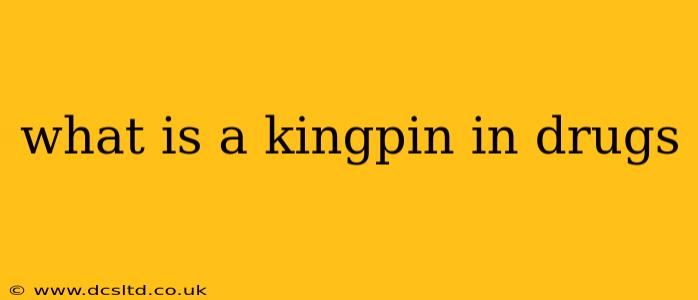What is a Kingpin in Drugs? Understanding the Role of High-Level Drug Traffickers
A drug kingpin, also known as a drug lord or narcotrafficker, is a high-ranking leader in an organized crime syndicate involved in the large-scale trafficking of illicit drugs. They occupy the apex of the drug trade pyramid, orchestrating and overseeing vast networks responsible for the production, transportation, distribution, and sale of narcotics. Think of them as the CEOs of a criminal enterprise, wielding immense power and influence.
Their involvement goes far beyond simple street-level dealing. Kingpins are responsible for strategic planning, financial management, and maintaining relationships with corrupt officials or other criminal organizations. Their operations are often international in scope, requiring sophisticated logistical networks and significant financial resources.
What are the responsibilities of a drug kingpin?
A drug kingpin's responsibilities are multifaceted and complex. They include:
- Strategic Planning and Leadership: Kingpins are responsible for developing long-term strategies for their criminal enterprises, including identifying new markets, securing supply chains, and adapting to law enforcement crackdowns.
- Financial Management: The massive profits generated by drug trafficking require careful management. Kingpins oversee the laundering of money, often through complex financial schemes and shell corporations.
- Logistics and Transportation: The movement of drugs across borders requires intricate logistics, including the use of various transportation methods (ships, planes, trucks) and the establishment of secure routes and storage facilities.
- Security and Enforcement: Kingpins maintain internal security within their organizations, managing conflicts between subordinates and dealing with threats from rival gangs or law enforcement.
- Corruption and Bribery: Often, kingpins use bribery and corruption to secure protection from law enforcement officials and gain access to resources.
What distinguishes a kingpin from lower-level drug dealers?
The key difference lies in the scale and scope of their operations. While a street-level dealer might sell small quantities of drugs to individual users, a kingpin orchestrates the movement of massive quantities across national borders. Kingpins also have significantly more resources and influence, allowing them to operate on a much larger scale and evade capture for longer periods.
How are drug kingpins brought to justice?
Bringing down drug kingpins is a complex and challenging task, often requiring extensive international cooperation and sophisticated investigative techniques. Law enforcement agencies utilize a variety of strategies, including:
- Undercover operations: Infiltrating drug trafficking networks to gather intelligence and evidence.
- Wiretaps and surveillance: Monitoring communications and movements to track the kingpin's activities.
- Financial investigations: Tracing the flow of money to identify assets and expose financial networks.
- International cooperation: Working with law enforcement agencies in other countries to track down and apprehend kingpins who operate across borders.
What are some examples of famous drug kingpins?
History is filled with notorious drug kingpins, each with their unique stories and methods. While discussing specifics is beyond the scope of this overview, researching figures like Pablo Escobar or Joaquín "El Chapo" Guzmán provides further insight into the reality of this criminal world. It is important to note these individuals were responsible for immense suffering and violence.
What is the impact of drug kingpins on society?
The actions of drug kingpins have devastating consequences, contributing to:
- Drug addiction and overdose deaths: The supply of illicit drugs fuels addiction and increases the risk of fatal overdoses.
- Violence and crime: The drug trade is inherently violent, often leading to turf wars, assassinations, and other criminal activity.
- Corruption: Bribery and corruption weaken institutions and undermine the rule of law.
- Economic instability: The vast amounts of money generated by drug trafficking can destabilize economies and contribute to political instability.
Understanding the role of a drug kingpin is crucial for comprehending the complexities and devastating consequences of the global drug trade. The fight against these figures requires a multifaceted approach involving law enforcement, international cooperation, and efforts to address the underlying social and economic factors that contribute to the problem.
